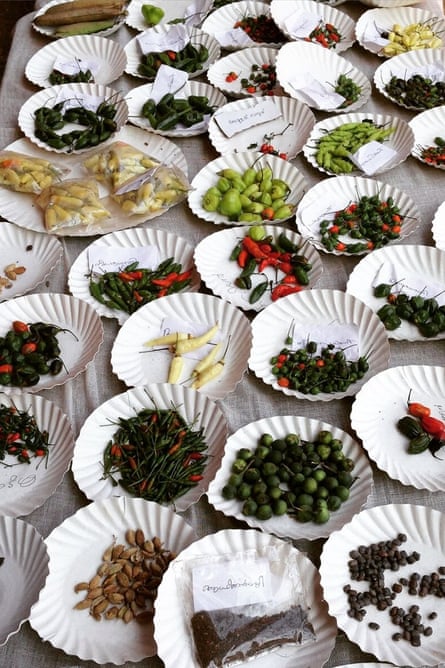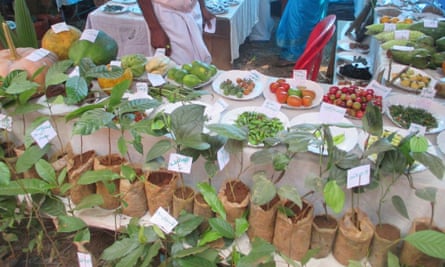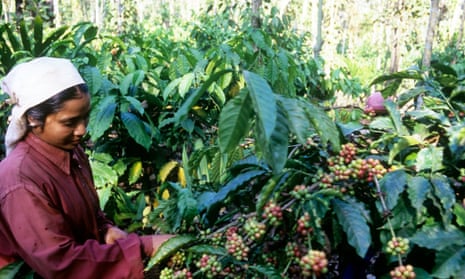A walk through the annual Kerala seedfest, in the sultry heat of India’s Western Ghats, is like a walk through a proverbial garden of Eden; okra the size of a hand; deep purple coloured runner beans; 26 varieties of chillies from one village alone. The size and colours of multiple bananas on offer here make a mockery of the fact that your average supermarket sells just one type.
With women and men standing proudly alongside their produce, this celebration of seeds and biodiversity is the future of farming: it is abundant, resilient and most importantly, smallholder led.
As farmers cope with the dual crises of a changing climate and rising population, the debate rages about the future of agriculture, with large-scale agribusiness being pitted against smallholders. In one corner, agribusiness is perceived as more efficient and technologically savvy; in the other corner, the smallholder is portrayed as less productive and in need of charity. Scale is generally perceived as the measure of success in farming, as with everything else: farmers are effectively told to expand, innovate, or move on.
But a collective of 4,500 farmers who call themselves Fair Trade Alliance Kerala (FTAK) are at the annual gathering to demonstrate their own third way: small scale, innovative, market-embracing and sustainable.
According to their chair, Thomas Kalappura, most FTAK farmers produce on about 1.5 hectares (3.7 acres) of land, smaller than your average smallholder in the developing world. Their earnings however are higher than others in the region – a typical farm earns about 1.5 lakhs per year (about £1,500) – as compared to an average annual farm income of about 0.77 lakhs (77,000 rupees) for India as a whole.

The Western Ghats is one of the most biodiverse areas in the world, and is not arid unlike other regions of India that can suffer from severe drought and failing monsoons. And they grow staples that are prized worldwide, mainly spices, but also cashew nuts, coffee, and rubber.
But FTAK’s success goes beyond the underlying conditions, as many farmers in Kerala have not fared as well. Organic farmers, in particular, face an initial uphill battle, where seeds are more expensive or even unavailable and the market often won’t reward the added cost associated with organic farming.
FTAK was founded in 2005 by Kerala’s first organic store, Elements, in Kozhikode, which was seeking to offer local market access to the growing number of organic farmers in Kerala. At the time, farmers were fighting plummeting agricultural commodity prices, and, following Kerala’s intensely leftwing traditions, were seeking to confront the issues of trade justice. They shunned the idea of the “farmer needs to be rescued” mentality and embraced the concept of “trade not aid”, initially associating with the then burgeoning Fairtrade label.
They started with the strong base of organic farmers and created a cooperative, but uniquely, branched out to work with mainstream farmers who later converted to organic after seeing the market potential.
FTAK is a not-for-profit democratically governed small farmer organisation, and Elements is now FTAK’s trading arm. Participation is intensive, and Tomy Mathew, one of the founders of FTAK, considers this to be the main reason for their success, as local groups are involved in everything from microcredit to the preservation of indigenous seeds. It is time consuming, but worth it, argues Aniamma Roy, a farmer and vice chair of FTAK: “My normal day starts at 5am, milking the cows, and doesn’t end until around 10pm. As the head of the local group and vice chair of FTAK I have to set aside a significant amount of time for organisational work and my husband then has to pitch in more in managing the household chores and tending to the cattle and the farm. We have fortnightly meetings of the local FTAK group and district and state level organisational work means that I have to travel from my village at least once a month, sometimes more often.”
“Our governance gives farmers agency,” says Mathew. “This has enabled us to secure higher prices in the market because we are stronger in numbers and can negotiate more effectively. FTAK has ensured that local market prices never fall below a certain benchmark, and we’re now keenly watched by industry.”
In 2013, as Elements launched its own line of branded products, including coconut oil and cashew nuts across the country, FTAK rejected the official Fairtrade label for the domestic Indian market, even though they’ve been associated with the global movement for over a decade. Wanting to stand on their own feet, and promote their own vision of local fair trade – beyond compliance to a minimum set of standards, instead with a greater focus on biodiversity, local food security and gender justice. They seem to be succeeding. They now have a turnover of 350m rupees (about £3.5 million) and growing.
The future remains both an exciting and a challenging one for FTAK. “Farming is still not an activity that we can confidently ask our children to join,” says Roy, acknowledging that few children of FTAK members see themselves as becoming farmers, witnessing the challenges faced by their parents. Instead, they go on to become engineers, or doctors. “I am quite concerned about the future of farming and whether our children will adopt it as a proud profession. While I acknowledge that fair trade offers us a better deal compared to the conventional market, I am concerned that the prices offered can still not be called fair prices or prices that match our true cost of production.”

Elements branded products are intended to help overturn this perception, and start the journey towards making farming a viable way of life and an attractive proposition. Recognising that the Indian middle classes have swelled to 300 million, competition in the domestic market seems exciting and profitable. They aim to see at least 60% of what they grow sold domestically within the next 5 years.
Tomy however is sceptical of what he sees as the role of development actors in helping farmers like FTAK. “Development is the biggest white man’s burden. It prescribes solutions without cultural or geographical context. Justice, on the other hand is non-negotiable.”
“The challenge isn’t one of development” he argues. “It’s to ensure trade is more equitable. We will continue to engage in global markets, but on our own terms. Our primary focus is on protecting the crop and biodiversity of the region, ensuring the food security of farming families and in the long run, and also to reassert the central role of women in the management of the homestead farming economy. And we’ll do this as entrepreneurs on our own terms, not objects of charity.”
Join our community of development professionals and humanitarians. Follow @GuardianGDP on Twitter.

Comments (…)
Sign in or create your Guardian account to join the discussion